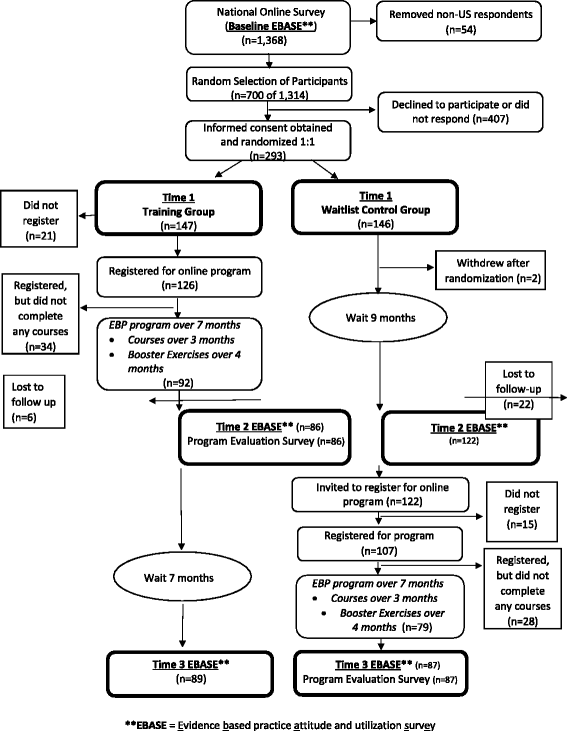The effectiveness and feasibility of an online educational program for improving evidence-based practice literacy: an exploratory randomized study of US chiropractors
- PMID: 27486510
- PMCID: PMC4970279
- DOI: 10.1186/s12998-016-0109-8
The effectiveness and feasibility of an online educational program for improving evidence-based practice literacy: an exploratory randomized study of US chiropractors
Abstract
Background: Online education programs are becoming a popular means to disseminate knowledge about evidence-based practice (EBP) among healthcare practitioners. This mode of delivery also offers a viable and potentially sustainable solution for teaching consistent EBP content to learners over time and across multiple geographical locations. We conducted a study with 3 main aims: 1) develop an online distance-learning program about the principles of evidence-based practice (EBP) for chiropractic providers; 2) test the effectiveness of the online program on the attitudes, skills, and use of EBP in a sample of chiropractors; and 3) determine the feasibility of expanding the program for broader-scale implementation. This study was conducted from January 2013 to September 2014.
Methods: This was an exploratory randomized trial in which 293 chiropractors were allocated to either an online EBP education intervention or a waitlist control. The online EBP program consisted of 3 courses and 4 booster lessons, and was developed using educational resources created in previous EBP educational programs at 4 chiropractic institutions. Participants were surveyed using a validated EBP instrument (EBASE) with 3 rescaled (0 to 100) subscores: Attitudes, Skills, and Use of EBP. Multiple regression was used to compare groups, adjusting for personal and practice characteristics. Satisfaction and compliance with the program was evaluated to assess feasibility.
Results: The Training Group showed modest improvement compared to the Waitlist Group in attitudes (Δ =6.2, p < .001) and skills (Δ =10.0, p < .001) subscores, but not the use subscore (Δ = -2.3, p = .470). The majority of participants agreed that the educational program was 'relevant to their profession' (84 %) and 'was worthwhile' (82 %). Overall, engagement in the online program was less than optimal, with 48 % of the Training Group, and 42 % of the Waitlist Group completing all 3 of the program courses.
Conclusions: Online EBP training leads to modest improvements in chiropractors' EBP attitudes and skill, but not their use of EBP. This online program can be delivered to a wide national audience, but requires modification to enable greater individualization and peer-to-peer interaction. Our results indicate that it is feasible to deliver an online EBP education on a broad scale, but that this mode of education alone is not sufficient for making large changes in chiropractors' use of EBP.
Keywords: Chiropractic; Evidence-based practice; Knowledge translation; Online education.
Figures
References
-
- Sackett DL, Straus SE, Richardson WS, Rosenberg W, Haynes RB. Evidence-based medicine. New York: Churchill Livingstone; 2000.
-
- Hall G. Attitudes of chiropractors to evidence-based practice and how this compares to other healthcare professionals: A qualitative study. Clin Chiropr. 2011;14:106–111. doi: 10.1016/j.clch.2011.06.003. - DOI
Grants and funding
LinkOut - more resources
Full Text Sources
Other Literature Sources


